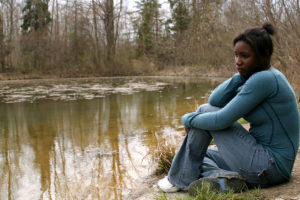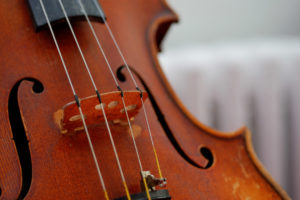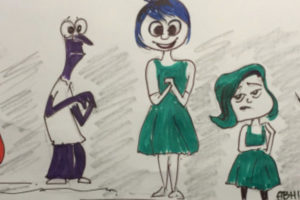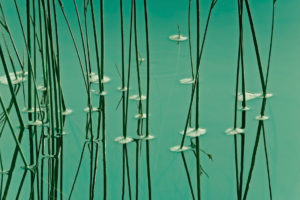When first-year students arrived on the University of Wisconsin–Madison campus in fall of 2020, some marked the occasion by stepping foot inside a classroom, while others “logged on” to virtual classes from their residence halls, apartments or home towns.
In addition to the excitement of starting college, there was also uncertainty and a sense of missing out on experiences derailed by the pandemic.
Marcellus Lawrence, a first-year student from Milwaukee and UW–Madison PEOPLE program scholar, looked forward to making new friends on campus but had difficulty connecting while wading through physical distancing and masks. Katie Zimmerman, another first-year from Hartland, Wisc., was excited about the idea of learning in person and getting to know her instructors and classmates. The start of an all-remote semester left her feeling anxious, overwhelmed and unrooted. Charlie Kennedy, a first-year from San Francisco, Calif., was training to try out for the university crew team only to be thrown off by becoming ill with COVID after friends became sick.
Yet each student worked through their hardships with a new set of skills and resolve.
These students, among nearly 150 others, took part in a new kind of class that focused not on traditional subjects like chemistry or literature, but rather their own minds. The result for many: personal growth from life’s setbacks and a renewed sense of meaning in their lives.
The semester-long, three-credit course, “The Art and Science of Human Flourishing,” was designed with first-year students in mind. It is supported by the Center for Healthy Minds at the College of Letters & Science and taught by a team of instructors, each bringing their own expertise from the sciences, the humanities, and student development as well as a wide range of cultural knowledge as it relates to human flourishing and a diverse set of lived experiences.
The task for students is both simple yet profoundly complex: What makes a life worth living?
This question inspired students to discover their own definition of flourishing as well as develop skills – such as mindfulness – to lead a more engaged life. And the need is greater than ever as today’s college students are experiencing alarming rates of mental health issues, with especially dramatic increases in anxiety and depression.
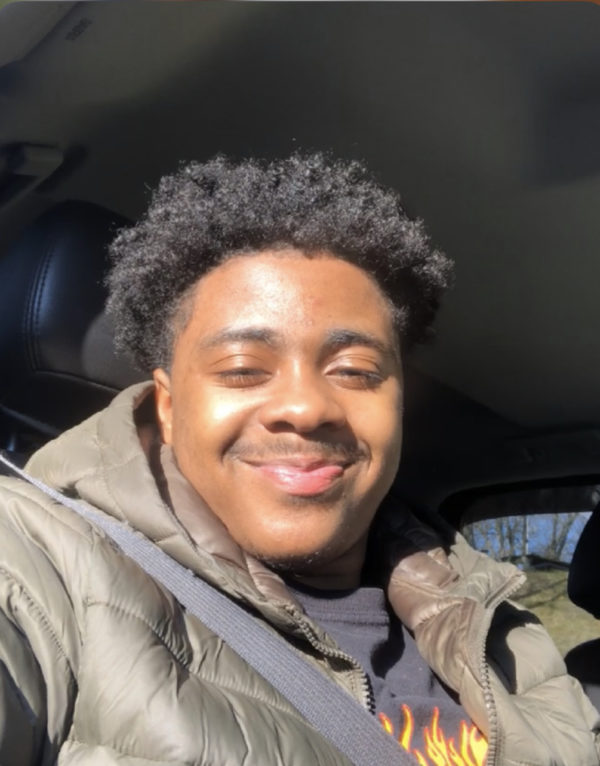
Brick By Brick
Marcellus Lawrence knew campus was going to be different because of COVID, but didn’t realize how challenging it would be.
“It was a struggle to meet new people,” he says. “I expected to be placed in an environment and thrive. When you’re used to learning in person and now you’re online, your motivation diminishes significantly.”
Lawrence, who is considering majoring in nursing, found his views and priorities slowly transforming over the duration of the Art and Science of Human Flourishing class, where assignments focused on bringing the course material to each student’s own life. He discovered his definition of flourishing not to be a destination or an “aha” moment, but rather a process that is in itself enriching and rewarding.
“I previously thought flourishing was shown by the amount of success one encounters,” Lawrence says. “But it isn’t measured at all. It’s the small end goals and everything we do leading up to those goals. Transforming and being resilient are our checkpoints. It’s being built brick by brick by each individual human.”
For him, the mystery of it all is what he taps into. Since taking the course, he has prioritized small actions and goals as meaningful acts of flourishing – being a more patient person in his household, helping older neighbors shovel their snow, reflecting and sending out “thank you” notes for people who celebrated his birthday, and keeping in touch with his grandparents.
The course made him aware of what mattered to him: “Taking care of the people that take care of me.”
"I previously thought flourishing was shown by the amount of success one encounters. But it isn’t measured at all. It’s the small end goals and everything we do leading up to those goals. Transforming and being resilient are our checkpoints. It’s being built brick by brick by each individual human.”
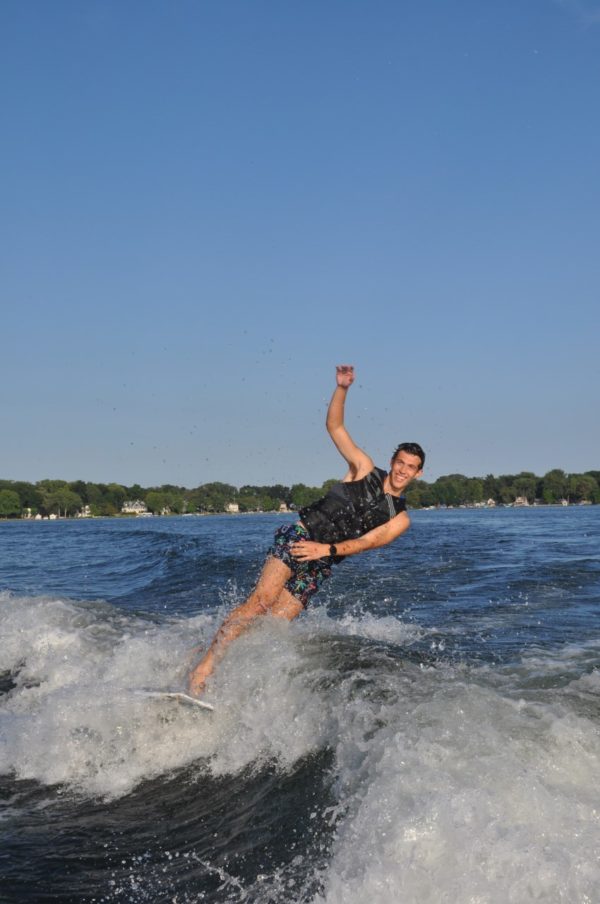
Tearing It Down
Yet it’s also the messy, deconstructive nature of the course that students found valuable.
Charlie Kennedy saw just how interconnected everyone is – for better and worse – last fall. Becoming ill with COVID from a few friends who went to a party, Kennedy felt disappointed and frustrated. He says he picked up some of the skills to cope from the course at the perfect time.
“I just had to roll with the punches. I learned that life in many ways is a collection of happy and sad moments, and ups and downs,” Kennedy says. “The only thing you can do is appreciate the things you have and realize that nothing is static. You can control the way you respond to things.”
In particular, the reflection essays and journals from the course opened his eyes to see vulnerability as a strength instead of a weakness or something to avoid.
“Learning how to be vulnerable around other people is the perfect gift,” he says.
Challenging old ways of thinking also helped Anna Maldonado, a pre-veterinary medicine major from Troy, Wisc., whose upbringing forced her to be resilient and independent. Yet the course helped her realize that flourishing to her is having a sense of community that “you can rely on and supports you” – that no one person can go at it alone. It created space for her to be more compassionate with herself and realize that she needs other people and they need her.
“The only thing you can do is appreciate the things you have and realize that nothing is static. You can control the way you respond to things.”
Being OK with Not Being OK
The course, derived from a broad range of scientific and humanistic sources, mirrors some realities that are also borne out in psychology – that emotional well-being isn’t about having only positive emotions, but accepting and working through difficult or negative emotions.
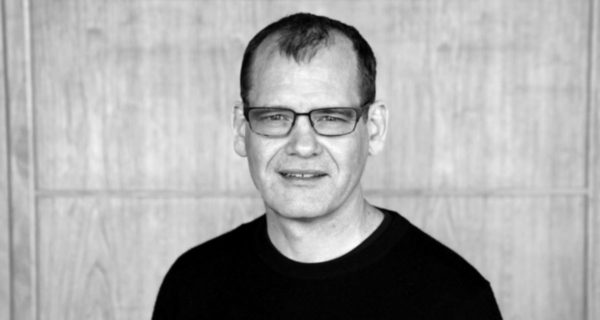
“It’s not about being happy all the time,” says course instructor John Dunne, who is the Distinguished Chair in Contemplative Humanities at the Center for Healthy Minds and professor of Asian Languages and Cultures. “Flourishing to me personally is feeling that life is full and rich and rewarding and challenging all at once. There’s a sense of ongoing growth that comes with engaging the challenges of life where those challenges don’t take over.”
The idea of accepting when we’re unhappy isn’t new, but teaching students the skills on how to actually do that is a relatively new frontier for schools and colleges. Dunne along with instructors for the course are making use of both declarative and procedural learning. In addition to the course content (for example, one reading might focus on the history of flourishing in cultures indigenous to the United States), the instructors also share the know-how of integrating new skills in their day-to-day.
One way to access these skills is through one’s embodied experiences – bodily sensations, thoughts, emotions – that can be observed during contemplative practices such as meditation.

Meditation practice resonated with Srideepti Marada, who is a PEOPLE scholar majoring in neurobiology and took the course.
“If I wake up one day and feel off, it’s totally OK to feel that way,” she says, pointing out that paying attention to her inner experiences has given her insight into why she may be feeling a certain way. “I want to figure out why and get a gist of why I feel this way. Your thoughts and your body will give hints.”
After accepting what she’s feeling or coming to terms with understanding the root issue, letting go and moving on is also equally important, she says.
Like Marada, other students in the course found solace in the opportunity to simply be with their own emotions, regardless of what they are. Students experienced family members being sick from COVID along with other effects from the pandemic, from family and friends losing jobs and income, struggling from isolation to a lack of support – all on top of acute traumas from overt and systemic racism.
“If I wake up one day and feel off, it’s totally OK to feel that way. I want to figure out why and get a gist of why I feel this way. Your thoughts and your body will give hints.”
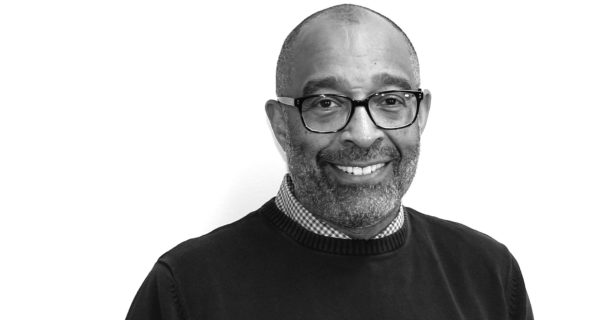
After the murder of George Floyd and the global protests that followed, it became even more important for students to have a place to be real with each other. Tony Chambers, Senior Instructor in the Department of Counseling Psychology and Director of Equity, Inclusion and Innovation at the Center for Healthy Minds, co-taught the course and led a discussion section for first-generation students, low-income students and students of color.
“Having a Black instructor was meaningful to me,” says Bella Martinez, a biology major from Milwaukee. “Dr. Chambers is someone who has had similar struggles but is comfortable and safe. I could share my voice about being a woman of color, and he would share his struggles and we got to see where he’s coming from. He’s dealt with struggles I’ve never felt.”
Chambers says it’s creating healing spaces for students to be their true selves that is central to his work as an educator.
“If people feel more broken than when they came in or are locked into old knowledge, we have failed as educators,” Chambers says. “The questions people ask reveal a lot about humanity, and the questions these students were asking were blowing me away. I was more their student than they were mine.”
"I could share my voice about being a woman of color, and he would share his struggles and we got to see where he’s coming from. He’s dealt with struggles I’ve never felt.”
Godwill Oke, a research intern at the Center for Healthy Minds and psychology major, sat in on Chambers’ discussion section to observe and study the value of such spaces for promoting a sense of belonging and developing life skills to thrive at UW–Madison and beyond.
“I wish this course was something that everyone had the chance to take,” Oke says. “Having a course more dedicated to my well-being and transitioning as a student of color within the demographic of UW would have given me a better skill set to hit the ground running when I was a freshman.”
“Having a course more dedicated to my well-being and transitioning as a student of color within the demographic of UW would have given me a better skill set to hit the ground running when I was a freshman.”
Rebuild and Ripple
For some students, the pandemic has provided the space to pause and reflect on what’s truly important. The pain and hardship of the last year have driven students to challenge the status quo in their own lives and in society.
What if entire campuses taught such skills for being in the world and discovering flourishing?
That’s what Susan Huber Miller, Director of Academic and Continuing Education Programs at the Center for Healthy Minds, is exploring through the flourishing course and campus partnerships to support students’ emotional well-being.
“If we offer the class to entire campus communities, more and more students would be walking around campuses with the acknowledgement and reflection that every interaction they have has a ripple effect – both positive and negative,” she says.
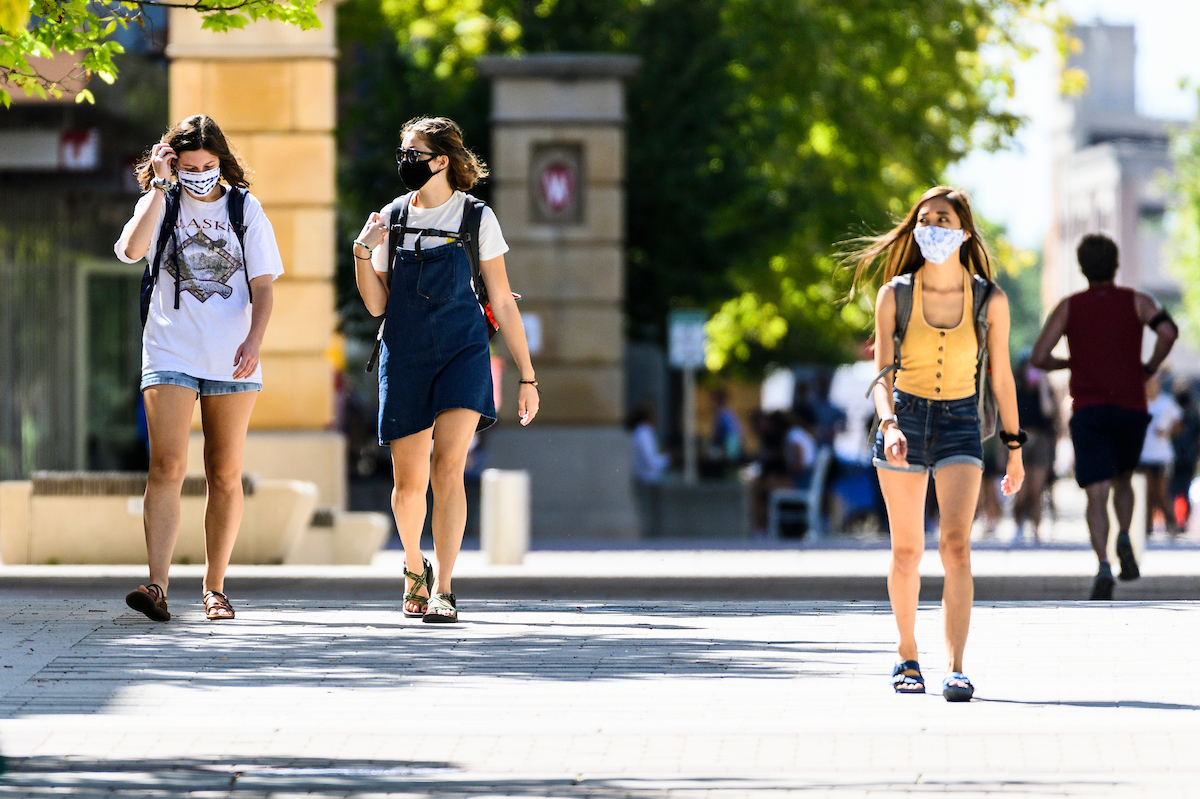
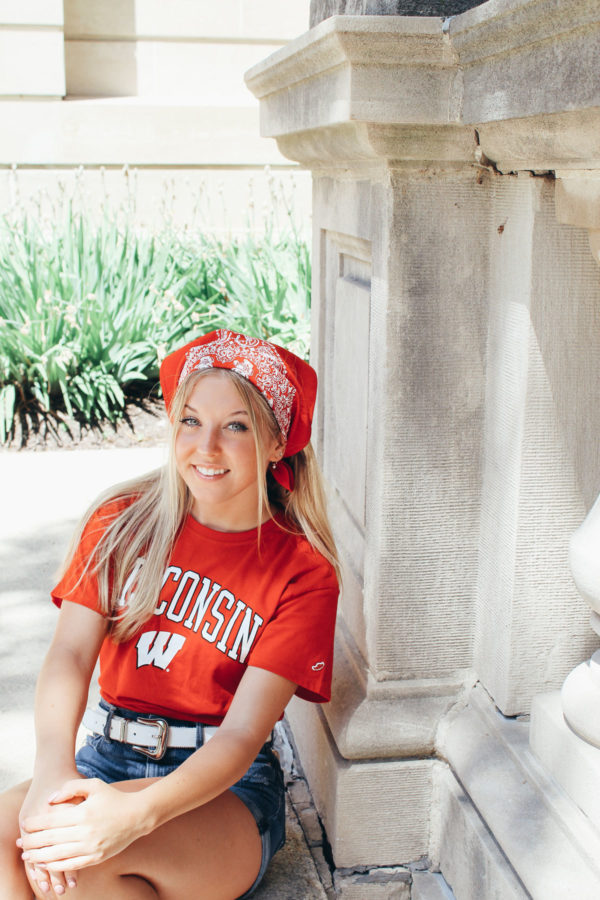
Katie Zimmerman, a first-year pre-medicine student, noticed the positive effects from the course via the supportive staff leading it. Zimmerman’s first semester at UW–Madison was a reckoning with her own needs in order to be successful.
“I do struggle a lot with mental health and also struggle with reaching out and getting help from other people,” she says. “I was struggling from not making connections with educators and other students because of remote learning. My mental health started declining.”
As a result, Zimmerman felt that she could no longer enjoy learning – a big loss for her.
She was thankful to have reached out to Scott Anderson, a teaching assistant for the course, who took time to understand her struggles and sought to find resources on campus to connect her with, including the McBurney Disability Resource Center, which turned out to be very helpful, she says. Ultimately, the course gave her the tools to accept the shifts in how she saw herself – from being a “go-getter” to needing and learning to thrive with additional support.
The process of transformation – being vulnerable, challenging one’s assumptions, rebuilding and growing, constantly questioning and making connections – is where flourishing seemed to reside for many students, and that’s the point. It looks unique for each person.
“As an educator, my job is to empower students to discover what flourishing is for themselves. It really requires deep work and reflection,” says Dunne. “It’s incredibly rewarding to see the impact on students and their motivations to spread flourishing in their own lives. It’s not getting better at a subject like calculus or Sanskrit. It’s getting better at life.”
“As an educator, my job is to empower students to discover what flourishing is for themselves. It really requires deep work and reflection."
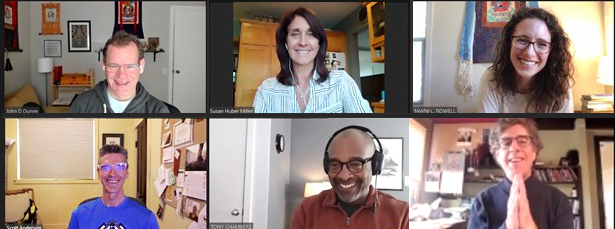
The Art and Science of Human Flourishing is cross-listed among Psychology, Counseling Psychology, Educational Psychology and Asian Languages and Cultures. For more information, contact Susan Huber Miller. To support the course, you can make a gift here.
-Marianne Spoon

